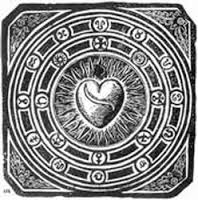XI WHEREBY THE BEAUTY OF SOLITARY LIFE IS TO BE PRESERVED AND HOW IT CAN BE A CAUSE OF GOD’S BEING GLORIFIED
It is becoming for the solitary to be in every way a vision of stimulation unto those who look at him, so that because of the beauties which radiate from him on all sides as the rays of the sun, even the enemies of truth unwillingly acknowledge that the Christians have a well-founded hope; and from every side they will flow to their place of refuge, and thus the head of the church will be elevated above its enemies.
Thus the glory of the solitary’s deeds will be a stimulus for many to withdraw from the world. And (it is becoming) that he be reverenced by every one on account of his excellence, so that the mouth of the members of the church will be opened on his account and their head exalted above all creeds.
The pride of Christ’s church consists in the behaviour of the solitaries. Therefore it is becoming to the solitary that the beauties of his habits shine on all sides; in the humble attitude of his limbs, in the simplicity of his habit, in his elevation above visible things, in the veracity of his renunciation, in his rigorous fasting, in his being continuous silent, in the subduing of his senses, in the continence of his aspect, in his not being quarrelsome with other people for any reason, in the sparingness of his speech, in his being pure from rancour, in his discriminate conscious simplicity. And (it is becoming for him) that it be known that he is alien to this harmful and fleeting life and near to true and spiritual life, from his constantly being by himself, from his being unknown among men, from his not being tied to any one by the bonds of comradeship and intimacy, from his quiet dwelling place, from the small space of his habitation, from his few and mean utensils, from his avoiding men, from his constant prayer, from his hating and avoiding honor, from his not being bound by temporal life, from his great patience, from his endurance in temptations, from his keeping aloof from rumours and from inquiries into worldly affairs, from his constant care for and meditation upon his true country, known by his sad countenance and his shrivelled face, from his constantly weeping night and day, and above all from his cautious chastity and his freedom from covetousness in small and great things.
These are, in short, the manifest beauties of the solitary which testify to his being wholly dead to the world and near unto God.
It is becoming for him to think of these things constantly in order to acquire them.
If any one asks: Wherefore are these lengthy descriptions necessary? I answer: they are very necessary. For if any one search for them, one by one, in himself, and if any fail him who cares for his life, he can ascertain from these distinctions his deficiency in any of the virtues. And thus these descriptions may become to him admonitions. And if he possess personally all the things described and also those omitted, the knowledge of them is given him (in this way) and so he will become a cause of God being praised among men and angels. And then he may prepare for his soul a place of rest before departing this world.
